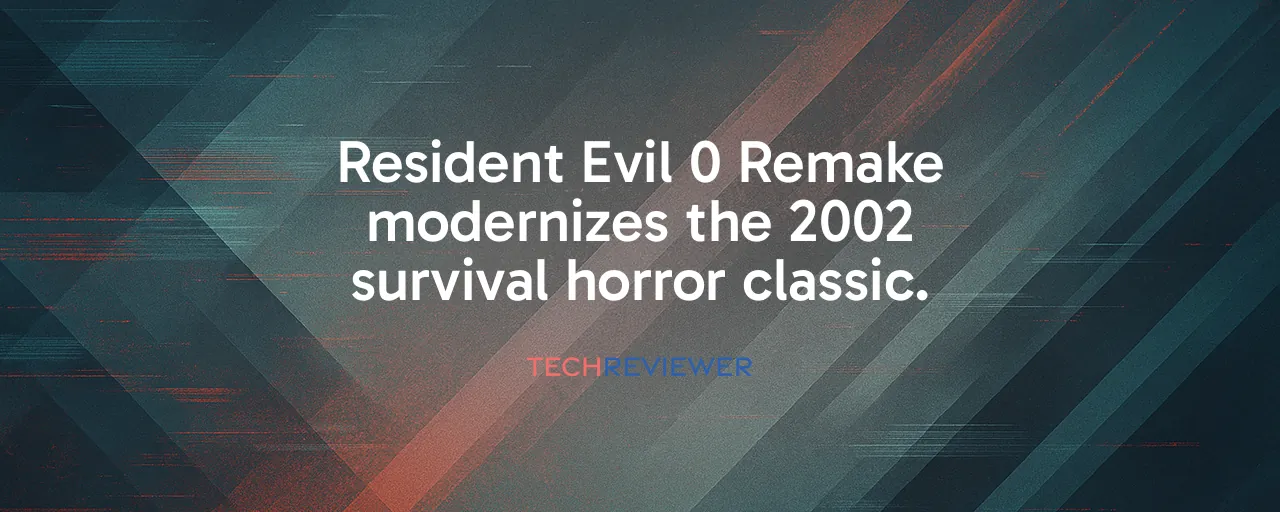A New Chapter for Survival Horror
Capcom's knack for breathing new life into its Resident Evil series has fans buzzing again. Reports surfaced in October 2025 about a Resident Evil 0 Remake, codenamed Project Chamber, slated for a 2028 release. This prequel, first launched in 2002 on GameCube, follows S.T.A.R.S. medic Rebecca Chambers and convict Billy Coen in a tense survival horror tale. The remake promises to overhaul the original's clunky mechanics while expanding its story. This move that could redefine how we experience classic horror games.
What makes this project stand out is Capcom's track record. Their remakes of Resident Evil 2, 3, and 4 didn't just update visuals; they reimagined gameplay and storytelling for modern audiences. With Resident Evil 0, the stakes feel even higher. The original faced criticism for awkward partner-switching and inventory headaches, but it also earned praise for its eerie train sequence. Fans are eager to see how Capcom tackles these highs and lows, especially with a new narrative thread and a character stepping into a bigger role.
Learning From Past Remakes
To understand what Resident Evil 0's remake might achieve, look at Capcom's Resident Evil 2 Remake from 2019. It sold over 15 million copies, blending cutting-edge visuals with tight controls, all powered by the RE Engine. The game kept the original's tense atmosphere but swapped fixed cameras for a third-person perspective, making it accessible to newcomers while thrilling veterans. This balance turned it into a benchmark for remakes, showing how to honor a classic while embracing modern design.
Contrast that with Square Enix's Final Fantasy VII Remake in 2020. It took bold risks, rewriting key story elements, which sparked heated debates among fans. While it sold millions, some felt it strayed too far from the 1997 original. Capcom seems to be taking a middle path with Resident Evil 0, enhancing the narrative without rewriting its core. The lesson here is clear: successful remakes evolve the original game thoughtfully, ensuring new players dive in while loyal fans feel respected.
Tech Powering the Terror
Capcom's RE Engine is the backbone of this remake, and it's a beast. Since 2017, it's driven every Resident Evil title with jaw-dropping visuals, from realistic character models to dynamic lighting that makes every shadow feel alive. For Resident Evil 0, expect smoother partner mechanics that replace the original's clunky AI with responsive controls. Reports suggest players might toggle between first- and third-person views, a potential gameplay enhancement under consideration for the remake.
The engine also enables richer storytelling. Motion-capture tech will bring nuanced performances, with actor Jon McLaren reportedly cast as Billy Coen. Known for his role as Star-Lord in Marvel's Guardians of the Galaxy game, McLaren's involvement hints at a polished, cinematic experience. This shift to full performance capture, unlike the original's basic voice recordings, could make character interactions feel more human, amplifying the horror of their desperate fight for survival.
Fans Weigh In on Changes
Resident Evil 0's fanbase is a passionate mix, and the remake has them talking. Some players can't wait for modernized controls and a deeper story, especially after the original's inventory system drove them up the wall. The lack of item boxes and constant backtracking were sore spots in 2002, and fixing these could make the game more inviting. Others, though, worry about losing the original's unique vibe, like the haunting train setting that still stands out as a highlight.
Casting changes stir the pot too. Replacing the original voice actors, a pattern seen in past remakes, has some fans nostalgic for the 2002 performances, however stiff they were. Yet, fresh talent like McLaren could elevate the story's emotional weight. The broader gaming community, including streamers and content creators, sees the remake as a chance to revisit a cult classic, sparking lively debates about balancing nostalgia with innovation.
Why Remakes Keep Winning
Capcom's remake strategy is a masterclass in tapping into what players want. In 2025, 90 percent of gamers played a remake or remaster in the past year, drawn to updated versions of games they love or missed. Resident Evil 4 Remake sold 10 million copies faster than any other in the series, proving the formula works. These projects cost less than new titles, often ranging from 60 to 200 million dollars, and leverage existing brand loyalty for lower marketing costs.
Still, not everyone's sold. Some developers argue remakes crowd out new ideas, with rising AAA game budgets hitting 200 million dollars or more. Capcom counters this by balancing remakes with original titles like Resident Evil Requiem. The market shows no signs of slowing, with 76 percent of players citing emotional connections as a key draw. For Resident Evil 0, Capcom's challenge is to deliver a fresh experience that feels both familiar and forward-thinking, keeping the horror genre alive for another generation.
